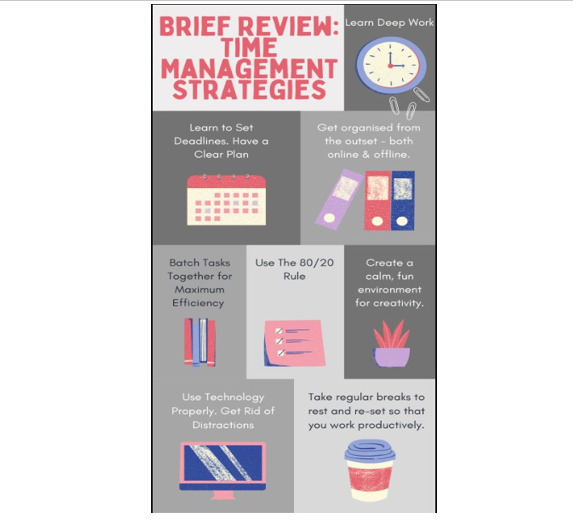
 Data Structure
Data Structure Networking
Networking RDBMS
RDBMS Operating System
Operating System Java
Java MS Excel
MS Excel iOS
iOS HTML
HTML CSS
CSS Android
Android Python
Python C Programming
C Programming C++
C++ C#
C# MongoDB
MongoDB MySQL
MySQL Javascript
Javascript PHP
PHP
- Selected Reading
- UPSC IAS Exams Notes
- Developer's Best Practices
- Questions and Answers
- Effective Resume Writing
- HR Interview Questions
- Computer Glossary
- Who is Who
How Effective Time Management of Projects Can Ensure Scheduling and Delivering Projects On Time
Introduction
As a project manager, you will be tasked with developing the project scope and dividing the larger project into smaller tasks. Deciding the timeline for the smaller tasks becomes more manageable when you do that. Ensuring timely completion of the project is crucial. Nevertheless, the inquiry persists as to how one can ensure the efficient implementation of time management for a given project. A recommended approach would involve establishing a clear timeline for task completion and deliverables. This is also considered a necessary requirement for effective project management. Efficient project management is crucial in ensuring timely project delivery.

Planning the Schedule of the Project
It is advised to start by defining the project scope to achieve appropriate time management. Establishing a specific plan for each work within the project is crucial when developing the project scope.
The plan must define the timeline and the suitable time for deliverables. Here the result of the task must be considered as a deliverable. The project scope defines the product's functions and the work's range. However, when you break down the scope, it should provide information regarding the requirements of the individual tasks of the project.
When formulating the scope, it is imperative to establish distinct schedules for each individual task. To ensure the project's timely completion, accurate deliverable timelines must be established before moving to the project plan. The following elements should be considered for successful time management:
It is essential to have conversations with the team members involved to determine the expected time needed to complete each activity before creating the timetable for the project. It is vital to make sure that the deadline set is fair and reasonable for the other teams participating while still being realistic and doable for your team. The appropriate and established duration for a task should take into account the degree of complexity involved.
-
While discussing the timeline, you must keep certain limits as a buffer. You want the task to be manageable for the team. Hence, it is always a good idea to buffer a time limit so your team can complete the task comfortably.
The initial stage of project planning for effective time management entails taking your team members' needs into account while creating the project schedule. A project schedule that takes into account the particular tasks included in the project would be advantageous. This stage is essential for implementing project time management effectively and enables you to effectively plan and complete projects within the allocated time period.
Review and manage the progress of the individual tasks in the project
To ensure the timely completion of projects, continuous assessment and control of individual activities within the project are required. By breaking the project down into distinct tasks, it can be possible to estimate the time needed for a team to complete each task. For this, it is vital for every project manager to periodically assess how each task is going on.
Managing and reviewing a project's duties entails assessing its progress and your ability to finish it by the deadline. It's critical to think of every task as a deliverable. Take into account a situation in which you are working to complete a project of considerable size. Each task will be regarded as a deliverable because moving on to the next stage requires finishing each one first. As a result, the entire project can encounter delays, which would cause a delay in the final output.
As mentioned previously, regular assessment and supervision of each individual work within a project are vital for effective project time management. It is important to point out the root cause and provide the team with the necessary directions if it turns out that a task won't be finished within the allotted timeframe and the team won't be able to produce the desired result on schedule. Project managers have the opportunity to assist the team in realigning with the established schedule. Monitoring and managing the progress of project tasks facilitates timely project delivery.
Sequence the activities and estimate the duration
Efficient time management is essential to ensure the timely completion and delivery of the project. It is necessary to carefully sequence all project activities and accurately estimate the time required for each action. To properly address this matter, it is imperative to take into account the following factors:
All projects have human resources with dependencies you must consider while developing a timeline. You cannot assume all the dependencies when you keep a buffer time while creating a task schedule. Hence, it would help if you had a dynamic project plan that sequences all the activities and estimates the durations even with the dependencies. This can make project management effective, and you can ensure that the product is delivered on time. Thereby, you can ensure you can boost your business's goodwill.
When sequencing the activities and estimating the durations, you can consider the data from the previous projects, mainly if you have used the same resources. This will help you understand the performance of the resources when employed in the present project. With the help of this data, you can sequence the resource allocations and estimate the time the resources will take to complete the tasks.

Image 1: A brief infographic with time management strategies
When you can deliver the project on time, it becomes clearer. Effective time management involves resource allocation and estimation of the time to complete the tasks. This is essential to project management and time management.
Conclusion
Project managers must evaluate resource performance based on product delivery time. You must base the timeline and project deliverables on resource capabilities and ensure optimal resource performance. Thus, effective time management of projects includes several factors, not scheduling the tasks but managing and overseeing the performance and working of the resources.

